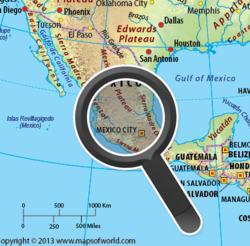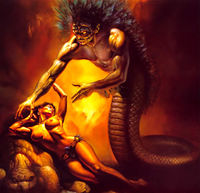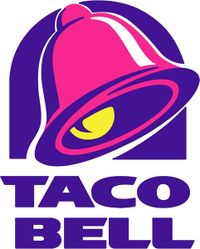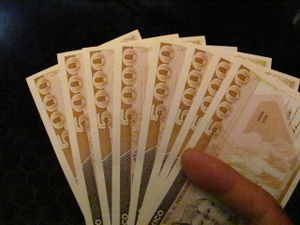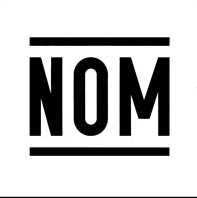Mexico
- For the original version of this article, see here.
Tacoland ¡Estados Unidos Norteamericanos! Mexico | |||||
|---|---|---|---|---|---|
| |||||
| Motto: ¡Órale! | |||||
| Anthem: "José Can You See" | |||||
| Capital | Tijuana | ||||
| Largest city | Taco Bell | ||||
| Demonym | Güey, Vieja | ||||
| Official language(s) | Spanglish, Aztec, something resembling Spanish (ya mero) | ||||
| National Hero(es) | Subcomandante Marcos, El Peje, Zorro, Pancho Villa, Chapo | ||||
| Declaration of Independence | From Spain: 1610 From USA: Pending From Soccer: Never | ||||
| Currency | Peso, Cocaine, Marijuana, Tortillas | ||||
| Population | Five; the rest are chilangos | ||||
| Major exports | Mexicans, Hydrocarbons, narcotics, warm bodies such as cooks and gardeners. and more Mexicans | ||||
| Major imports | All its culture and other American hand-me-downs | ||||
| National animal | Stray dog | ||||
“Doing the same thing over and over again, and expecting a different result, means that you are in Mexico.”
Mexico is a Latin American country that pairs total social dysfunction with a population that never asks why nothing works but patiently waits for things to be different later.
Mexico is bordered to the north by the United States, though the border is vague and moving further north; and on the south by several even scarier places such as El Humidor, with which the border doesn't matter. Mexico comprises 31 states, two territories aptly referred to as "B.C.", and three districts: a Federal District that is like Washington, D.C. but even smoggier, and the districts of Cancún and Acapulco, except that they are districts of the United States.
Mexico was originally populated by a special breed of human beings, namely the Aztecs and Mayans. They perfected the ritual killing of youngsters, long before the invention of the automobile, and predicted that the world would end soon. They were conquered by the Spaniards, who preached that the world would never end. In 1821, Mexico declared its independence, and modern Mexicans wonder why it is taking so long for the world to end.
Among American Presidents, Barack Obama surely thought he was in Mexico when he promised Americans that things would be different if they would only "hope" for "change." And, ¡ay, Chihuahua! he got away with it. And George W. Bush surely meant Mexico when he referred to the people who "are only doing the jobs that Americans won't do (at least, at the shabby wages we want to pay them)." These jobs include serving spicy meals that induce pain the next day, blowing off court dates, and making snap decisions to leave the expressway despite cruising in the fast lane.
History
The Aztec Empire
Long before Mexico became known as Narcoland, the Aztecs first occupied Mexico. They used a highly accurate calendar. However, as it had no concept of time zones, it is utterly useless today, except as something to put on the backs of coins, and as a basis for conspiracy theories and feature films about the arrival from outer space of giant illegal aliens.
The Aztecs are best known (thanks to minorities scholar Mel Gibson) for human sacrifice. But new archaeology suggests they never practiced it. The conquistadors who saw blood splattered on every wall were actually visiting an Aztec hospital after a successful heart-removal procedure. Even today, some tourists mistakenly believe they are in an Aztec temple when visiting a Mexican hospital that still specializes in such procedures. The well-organized Aztec ambulance system could transport patients from Huitzilopochtli to Tlaxcatlan Hospital in under three hours. The Aztec language, and the resulting epidemic of sprained tongues, is what made effective health care so vital.
In short, Aztecs were cute, cuddly, soft-spoken, and damned good at crossword puzzles and cross-stitch. Their placid and idyllic culture (except for the occasional ritual murder of children) would still be with us today if it hadn't been for the arrival of bothersome white people.
Spaniards Gone Wild
Francisco Hernández de Córdoba was the first European to visit Mexico. He came in search of slaves. However, on outlining his proposition (historians believe it went like, "Would you like to engage in hard labor for no pay until dying at a very early age?") his troops were chased back to their boats.
Later, Cortes took the precautionary move of burning the boats so there would be no turning back. Taco Bell had not reached the coast in those days, so Cortes and his men crossed the rugged mountains to the Valley of Mexico to meet with King Moctezuma. Amazingly, Moctezuma believed that Cortes was the god Quetzalcoatl (facepalm), who, according to prophecy, would return some day and teach the Aztecs words they could actually pronounce. This would not be the first time Mexico's leaders would sell their people a pig in a poke. By the mid-1500s, the Spaniards had taken over.
Modern Mexico is a delightful blend of all these cultures. From Spain, the Mexicans took bullfighting, bull-running down narrow city streets, and bull-throwing in 31 separate state legislatures. From the Mayans, we see a tendency to leave the native land; also, a tendency not to know the correct date. And from the Aztecs, the Mexicans preserve the unique tradition of violence, in the form of pointless coups, civil wars, military juntas, and hostile takeovers.
Spaniards gone away
In 1810, Miguel Hidalgo shouted the famous Grito de Dolores that statesmen repeat each Independence Day:
| “ | Hey Dolores, look at me! I'm up here on stage! Erm, Long live our Lady of Guacamole! Death to all Spaniards! Is this thing on? | ” |
The Mexicans got the message and told the Spaniards to piss off. Only eleven short and bloody years later, Hidalgo had been captured and executed, likewise the next guy, and Iturbide received his orders to finish off the rebels. But he switched sides and defeated the Spaniards. Then he switched sides again and made himself the government. The Mexicans could not do anything because, at that point, they were too dizzy.
Heady with the victory that had made the Spaniards go away, the Mexicans turned their attention to making Iturbide go away. A man named Santa Ana proved up to the task, and the task was putting himself in Iturbide's place. He became President four times, often even as the result of an election. Santa Ana fought fierce military battles with the United States. They featured showy victories at places like the Alamo, which made it easy to forget the losses, which included all of Texas, Kansas, New Mexico, Oklahoma, Colorado, and Wyoming. Can't win 'em all. Arizona he didn't lose in battle but sold fair-and-square.
First attempts at turbulent government
In 1858, the Mexican Congress elected Ciudad Juárez to be President. He was driven out of Mexico City and started his own Mexico in a city named Ciudad Juárez. The two Mexicos started fighting, and the United States allied with Juárez, until he got very late paying his bills. Napoleon thought he had a solution (just take over the whole country), but it didn't last. Juárez took back over, had a pleasant little firing squad for his replacement, and enjoyed five more good years until Porfirio Díaz took over.
Patriotic themes
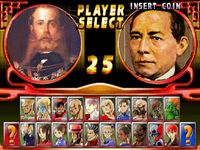
The turbulent periods in the Mexican past provide many patriotic images that inspire citizens during the turbulent periods in the Mexican present.
- Grito de Guerra
The Grito de Guerra (call to arms) rouses Mexicans to defend the Fatherland against hypothetical future invasions (not that invaders are exactly lining up to be the first) using the key tactic of making loud noises, which most Mexicans do capably even in peacetime. The Grito is featured in the Mexican National Anthem, which was written by Bocanegra during a brief period of spousal abuse. His part in the abuse was to write a song with ten tedious verses. The song is abbreviated at soccer matches so that it will be over before halftime.
- Niños Héroes
The Niños Héroes (Baby Heroes) illustrate the other prime Mexican strategy for fending off foreign invasion: Play the guilt card. This commemorates the Battle of Chapultepec, although the defenders, six military cadets, were not exactly babies, and were not exactly heroes. However, in this Mexican version of the Alamo, the six responded to certain defeat not by fighting to the last man, but by wrapping themselves in the Mexican flag and jumping off the wall to their deaths, a military version of the modern, "You can't fire me, I quit!" This is why the current Mexican five-year economic plan so strongly resembles a suicide pact.
Even more turmoil
In the 1960s, a rise in crime began. Famous criminal Speedy Gonzales stole approximately 6 million Old New Pesos (which would have ensured the fill-up of his getaway car) from Mexican banks in Monterrey, Cancún, and Toluca. President Sylvester "The Cat" Pussí made repeated attempts to apprehend Speedy, each one resulting in hilarious Technicolor pratfalls.
In 1972, a massive grass-roots campaign elected a write-in candidate named Pedro. Now, as often happens when you land at the airport and tell someone you have a car reservation with Avis, a throng of Mexicans sprang up, all of them claiming to have the desired name. One of them took office, quickly captured Gonzales, and ushered in the modern era of Mexico. The country fell into a dark phase where corruption and narcotraffic reigned, to be distinguished from the previous and following phases where corruption and narcotraffic reigned.
But two Mexican patriots, El Mariachi and El Chapulín Colorado (The Red Grasshopper) became vigilantes. They constantly battled Mexican drug lords and the crime network of El Santo. Between 1975 and 1980, this duo managed to lower crime throughout Mexico. You can still see them in action from the comic books of the period.
This movement came to an abrupt end in 1980, when El Santo passed away. He was succeeded by Antonio Banderas, who eliminated the vigilantes within months.
Government
Mexico operates under the Constitution of 1917, written by the same inspiration that also gave us the Soviet Union, and with mostly the same effects. The official name of the country is The United States of America of Mexico. Many other things about Mexico are also copied from the U.S. One thing that is not, is the requirement that amendments to the Constitution be approved by a lot of people, and the hefty document that has resulted is used more often to lift small children to the dinner table than is the Mexico City telephone book. The Constitution is also used more often for that purpose than it is used to determine whether an action of government is legitimate or not.
Mexico serves as a useful laboratory to prove that attractive reforms often proposed in other countries, such as a longer Presidential term, a prohibition on re-election, short, structured campaigns, and compulsory voting, do not change a thing.
The Institutional Revolutionary Party had complete control of the Mexican government since 1929. One can see how revolution can be institutional by looking at the water in a toilet just after operating the little lever. Vested interests could still purchase favors, but by competing inside the party rather than with the party. However, in 2000, Mexico surprised everyone by holding a fair election, which the National Action Party won. The result was neither national action nor anything much different from the other guys. After 12 years of pro-business government (for those in the business of running drugs), the people decided that corrupt autocracy had been just fine. Departing President Felipe Calderón, having been unable to change anything substantial about Mexico, proposed to just rename it, so as not to ape the name of a neighboring country. He suggested The People's Republic of Mexico.
The government is not the only thing that imitates the United States. Everything else does too, only it has "mex" added as a suffix. The telephone monopoly is Telmex, the petroleum monopoly is Pemex, and the country itself was recently renamed Mexmex.
Congress
The Mexican legislature wins originality points by being called "Congress" and consisting of two chambers. One is the Chamber of Deputies; which would leave the Chamber of Sheriffs. In each house, half of the seats are voted on through representative districts. Half of the remainder are decided by dividing Mexico into five parts based on nothing and having everyone vote on their favorite car. The political parties decide who gets these seats, one of the many ways that relieve Mexicans of their surprise (and of anyone to complain to) when what they vote for is not what they get. The other seats can be acquired for cash.
The bureaucracy
Every family has one member employed in government. He uses his staff car to run errands for family members, sometimes even for aunts and uncles. Most of these errands involve waiting in line, which he can do with confidence that the citizens waiting in line to see him will stay there even longer. Being a member of the bureaucracy usually ensures a person of an ample supply of Christmas gifts for the entire family.
Foreign policy
Mexico's border policy depends on whether we are talking "northern border" or "southern border."
To the south, policy involves an absolute prohibition on anyone entering or leaving, a system of strict work permits, and frequent imprisonment of offenders in squalid jails on vague charges, all of the above depending on whether suitable bribes are paid.
To the north, policy involves nuisance fees that must be paid with a U.S. credit card and frequent overtures to the U.S. President and Congress to let Mexican citizens swarm in with impunity and not use English, all of the above depending on whether suitable bribes are paid.
Mexico's relations with the U.S. involve a cultural exchange program in which Mexico's "Roads Scholars" assemble at educational centers like Home Depot, waiting for a ride to private homes to build roofs and discuss macroeconomic policy.
Economy
Mexico is a nation of narco-traffickers and therefore, all Mexican government alliances are closely linked with the most lucrative business in the world: drug trafficking. They are great commercial and political partners of Colombia, Venezuela, Peru and Bolivia who are also excellent producers of narcotics. Also, Mexico is lthe largest exporter of mariachis, tequila, Mexican soap opera, sombrero, taco, pepper and illegal imigrants, as well drug traffickers such as gang members invading California, Texas and New Mexico (Do you want more suggestive name?) with third world costums and Spanish accents (ugly people with faces of Peruvian Indians). Ninety percent of Mexicans immigrants living in the United States are traffickers, rapists and gardeners. But the great marjority of them say they are honest people. The Mexican economy has been plundered for over 90 years and continues to provide for the entire nation. There is frenzied activity as throngs of consumers move from one line to another and exchange pieces of paper for new, improved pieces of paper, many of which now have holograms.
Population
In Latin America, unlike Argentina, Uruguay and even the semi-Africa called Brazil, who still received extensive European immigration in the 19th and 20th centuries, in Mexico, only the country's elite are truly white, being mainly made up of descendants of one the darkest, moorish and ugly people of Europe along with the portuguese: the Spanish people (and Spanish are white?! Since when?) Surnames of foreign origin among Mexicans are rare. So if you see a caucasian man walking the streets of Mexico, you can be sure it's some foreign tourist. And make sure that this "gringo" will have 99% chance of being robbed or kidnapped by "narcos" and members of cartels that demand his realese in exchange for euros or dollars.
Money
Mexico's currency is called the peso. That is, each of Mexico's currencies is called the peso; and you need to learn the pictures and maybe check the fine print with the year of issue to tell whether you are being given New Pesos, Really New Pesos, New Improved Pesos, or those worthless Old Pesos. There is always a cartoon advertisement on television with decimal points playing hopscotch over zeros (three at a time) to give a cheerful illustration about how the $40,000.00 in your pocket will henceforth be known as $40 and will still not pay the complete bill for lunch. This is the reason why, up in the hills, they don't ask, "How many pesos for that chair?" but "How many thousands for that chair?" and they don't mean thousands.
Property
About the only thing on which the Mexican Constitution is clear is that nobody owns anything. You are welcome to maintain that house on Enemies of the Proletariat Avenue, and you can exercise "stewardship" forever over that small piece of the National Patrimony, but don't think that you own it. Foreigners can also be stewards of property, only not within 200 km of a national border or 300 km of a coastline. Unless you find a Mexican willing to sign the legal papers for a small fee ( read brive).
If the place comes with a maid and a chauffeur, and if they belong to a union, their rights to the place may be in competition with yours as the new "steward." Likewise if there is a gentleman living in a tent in the back yard. The key thing to remember is that money talks — and not the amount you paid to acquire the place.
Your children, on the other hand, will generally do what you ask them to. This is why most Mexicans realize that the only way to build a nest egg for retirement is to have fourteen kids. It helps that locally available condoms comply with the Official Mexican Standards for quality. These quality standards, known by the Spanish acronym NOM, certify the highest dependability that mind-numbing regulations and bribe-taking inspectors can deliver. The only higher rating is the triple award, pronounced "nom nom nom."
Corporations
Although no one in Mexico owns anything, corporations in Mexico own an awful lot. Corporate names end not with "Inc." or "Ltd." but with "S.A. de C.V." This is not one of those long, multi-part Hispanic surnames; it means sociedad anónima de capital variable — Anonymous society of variable capital. This phrase gives the average Mexican the reassurance that "we are not telling you who we are, and we are not telling you what we have."
NAFTA

“Iss not that we don' have jobs! Iss our job to be here!”
– Customs Agent Juan Enchilada de Serrano on NAFTA
NAFTA (the North American Free Trade Agreement) has resulted in many new jobs for Mexicans, mostly ensuring that all products have tedious labels in three languages that are too small to read. NAFTA is enforced by a network of Walmart stores, which now exist in every major city. The people don't shop there, however, as they find full shelves disconcerting and there are no cockroaches for the children to prod and tease.
As the National Action Party is known by its Spanish initials, which spell out "bread", NAFTA is sometimes referred to as naphtha, which is the same technique of convincing the Mexican people of something by suggesting that it might be good to eat.
NAFTA comprised more than 1000 pages, which is 1000 pages more than you would need if you were really after free trade. But inspectors to confirm that every shipment complies with the detailed rules for "liberalization" are another great new jobs program.
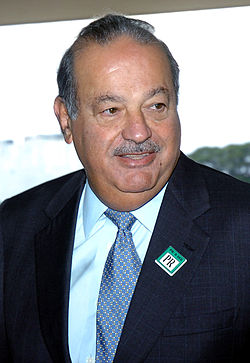
Since the treaty took effect in 1994, the Mexican people have been terrified of losing all their jobs to superior American quality—almost as terrified as the American people are of losing all their jobs to cheap Mexican labor. If the zone's 210,000,000 jobs all left at the same time, they would surely all wind up in the middle of the Rio Grande. This would hamper barge traffic but might increase the river's utility for sneaking into the United States.
Carlos Slim
The most remarkable thing of all is that this dirt-poor economy has produced the world's richest person. If no one is allowed to own anything in Mexico, no one told Carlos "Slim" Helú. This billionaire businessman has his own section in an article in UNCYCLOPEDIA, even though he is not really a "businessman," in the usual G-7 sense, and he is not really slim.
Mr. Helú owns a controlling stake in Telmex and thus derives a chunk-of-change, which is not slim either, every time a telephone is installed in Mexico, and may obtain a portion of the extra payment made to ensure that the installation is made without waiting the usual six months.
Mr. Helú is about to demonstrate Mexicans' notorious adaptability, as a majority of the nation has torn the telephone off the wall and gone cellular--even before the U.S. did.
Toll roads
Some Polynesians think the reason cargo planes with hot meals landed during World War II is that there were airports; and they still build bamboo "control towers" and wait. Likewise, Mexico decided it could be as rich as the United States by merely building Interstates. These now go halfway to everywhere the traveler wants to be. Moreover, new speed bumps in the old road at every little village induce the traveler to take the expressway.
Unfortunately, someone learned about tolls during a visit to Tokyo, and the resulting fares mean that the only people who use expressways are truckers and Americans. Most tolls are still collected by private enterprise, at toll booths consisting of a tree felled across the road. The highway-user's only protection against the highway-man is not to disclose that he has a lot of cash in the vehicle. This can only be achieved by not using the toll roads.
Military
Mexico's armed forces are non-nuclear, instead relying on the piñata and the jumping bean. Like those of Japan and Costa Rica, it is never to be used in conflicts against other nations. The southern border is defended by the fact that neighboring countries are even more disorganized and generally at war with one another instead. The northern border is not defended at all; that would keep everyone from getting to work in the morning.
The Mexican Army is prepared for the next period of total anarchy and insurrection. It will have hot meals ready for all the U.S. forces sent in to restore order.
Between conflicts, the Army trains by stopping and inspecting cars on rural national highways. Soldiers are paid a stingy salary but can supplement their income with tips.
The typical Mexican soldier carries both a battle rifle and a submachine gun. He can switch weapons by pressing Y, and jump by tapping the A button.
The intelligence bureau is the main sponsor of a competition where participants are encouraged to do something that pretends to be funny, but to all extent is not. The bureau claims that it is the thing that helps keep the defence industry of Mexico at a good level, so that Mexico can purchase and stash 10 billion pesos worth of weaponry within 24 hours, should Mexico be invaded. Everyone in Mexico knows that it is a (the only) way for Mexicans without humour (1 hundred and 17 point 5 million of them) to find work in the private sector inside Mexico. Some call it a work-programme by stealth. In 2013, the winners were the Mexican participants of a Spanish movie called Los amantes pasajeros.
Tourism
The wise tourist who hears a tout suggesting that he "come to the bitches" understands that it is just the persistent Mexican way of pronouncing English, and that the tout is actually suggesting a day trip to the ocean shore. However, regarding bitches, both Tijuana and Juárez have a thriving theater district where the same co-star with a variety of barnyard animals.
Cancún and Acapulco are tourist spots to U.S. standards, and compare favorably to any other place to spend spring break. Any waitperson is trained to explain to the customer in either language how the local water treatment plant was built to international standards (not just to "nom nom nom") and there is little risk of a debilitating bacterial infection. Nevertheless, the tourist need not tempt fate by ordering his mixed drink on the rocks.
The Gulf Coast is the only place left in the world where Americans are warmly welcomed, as the usual clientele is Canadian, and Americans, by comparison, do tend to tip in double digits.
See also
- So far from God, so close to the United States


